People the world over know Dennis Agajanian as “the world’s fastest flatpicking guitarist”—a moniker bestowed on him by country music legend Johnny Cash.
In addition to Cash, Dennis has shared the stage with such renowned musicians as Charlie Daniels, Ricky Skaggs, Michael W. Smith and Darius Rucker. More than a dozen times, he has garnered industry accolades such as Entertainer of the Year. The Inspirational Country Music Association has named him Musician of the Year multiple times, including in 2024.
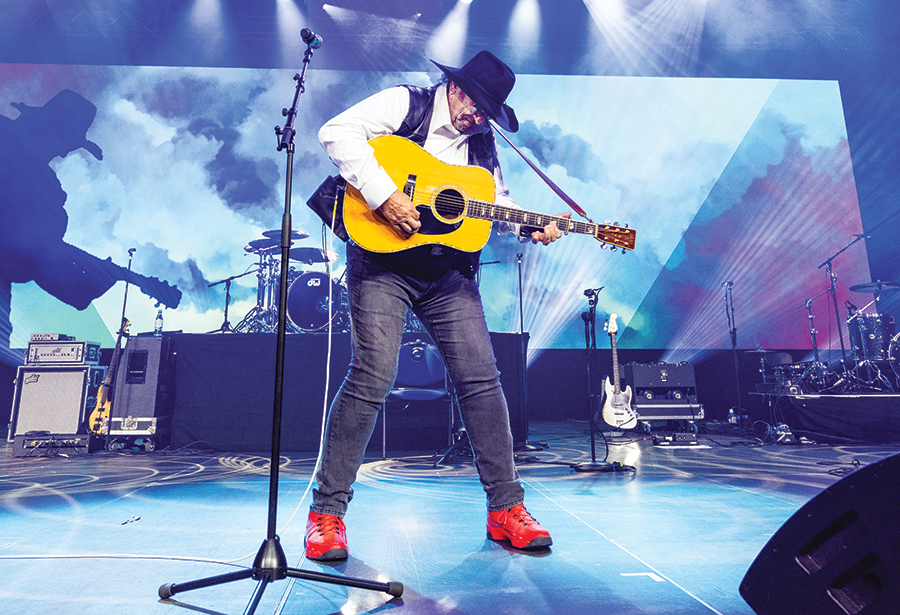
In 2020, that group also named Dennis Music Evangelist of the Year. A title like that should tell you there’s much more to Dennis Agajanian than mind-blowing guitar skills. The same zeal he brings to his music is on display when he shares the Gospel of Jesus Christ.
People who know Dennis well tend to use pairs of phrases to describe him, phrases that might seem surprising: A force of nature—yet sensitive to those who are hurting. Larger than life—yet one of the sweetest human souls. An imposing figure with a heart of compassion.
Perhaps no one has described him better than his best friend, Franklin Graham:
“He’s tough as a nail and not afraid to go anywhere or do anything,” Franklin wrote in his book Rebel With a Cause. “But he’s also got a tender heart for the Lord and a real burden to see lost men and women come to faith in Jesus Christ.”
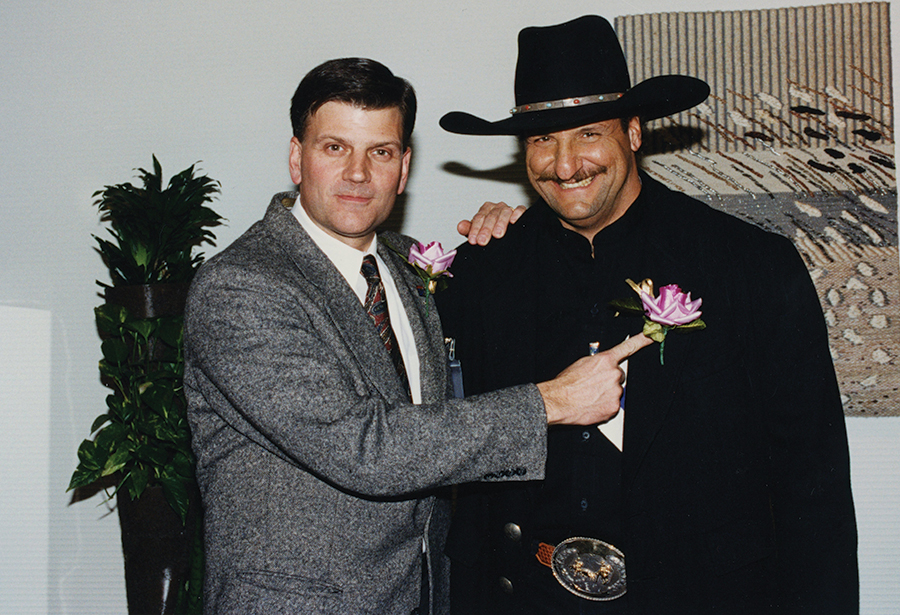
Dennis’ website, DennisAgajanianMinistries.com, reflects that burden. Right up front, the home page invites visitors to “Join Dennis in sharing the Gospel.”
Over the past 50 years, he has played at hundreds of BGEA Crusades, including meetings with Billy Graham, Franklin Graham, Will Graham and the late John Wesley White.
Franklin and Dennis met in 1975, when Dennis and his twin brother, Danny, were playing on the campus of Texas Tech in conjunction with Billy Graham’s Lubbock Crusade. Mr. Graham’s music director, Cliff Barrows, had invited them to participate after seeing them play at youth rallies for White’s 1974 Crusades in Modesto and Turlock, California.
“I hit it off with Dennis the instant we met,” Franklin wrote. “I soon discovered that Dennis loved four-wheel drive trucks, motorcycles, guns, and more important, the Lord Jesus Christ. That makes him my kind of guy.”
Over the years, Dennis has played at virtually every Franklin Graham Festival. He has also accompanied Franklin on scores of other ministry trips—often to places where both knew their lives would be in danger: places like Sudan, Cambodia and the Middle East, sometimes ministering as bullets flew and mortars exploded around them.
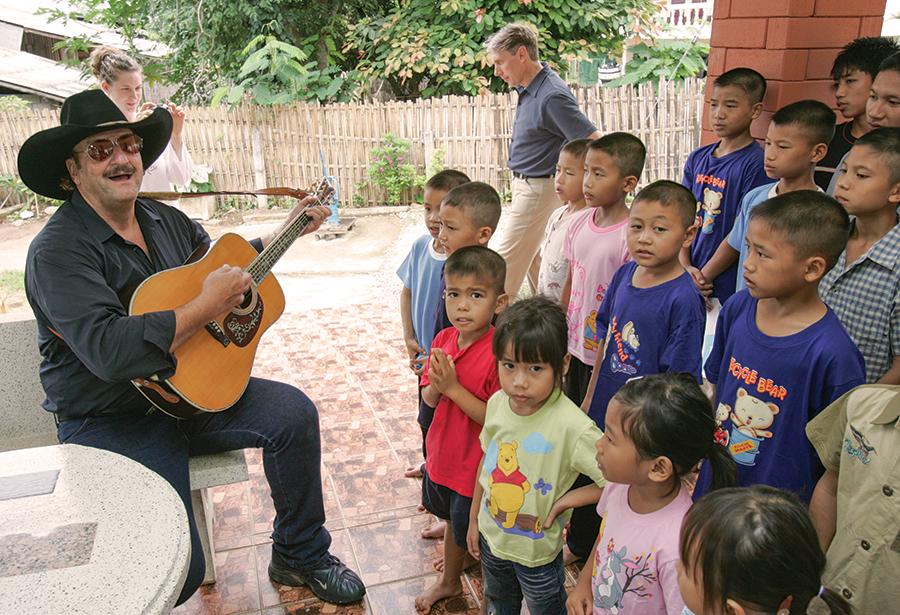
“One word that I think describes Dennis is passion,” says BGEA Chaplain Preston Parrish, who has known Dennis for more than 45 years. “Passion for the Lord, passion for the ministry to which God has called and gifted him, passion for seeing people come to know the Lord.”
As much as Dennis is known for his guitar playing, he also describes himself as a street preacher who loves the Word of God.
“I think it’s so important that we become students of the Word,” he said during a Facebook live event with The Upper Room, a ministry in Orange County, California. “People come up and say, ‘I want to get into music.’ Well, you’ve got to be a student of God’s Word first.”
He has shared the Gospel in challenging settings such as Pride marches, Black Panther rallies, Communist Party events and the annual Sturgis Motorcycle Rally. In 1967, he participated in a Campus Crusade evangelism “blitz” in Berkeley, California, where he struck up a conversation with a member of the Hell’s Angels motorcycle gang outside a coffeehouse. As he told the man about Jesus Christ, he realized that Billy Graham and Campus Crusade founder Bill Bright were standing behind him, listening to the conversation.
“Sir, would you like to continue?” Dennis asked Mr. Graham.
“You’re doing just fine,” Mr. Graham replied.
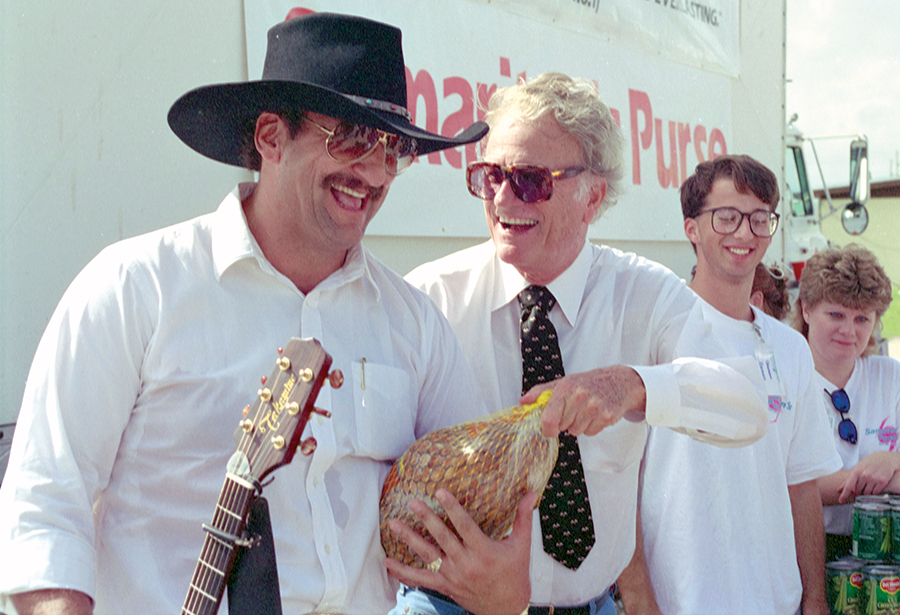
Dennis calls that a pivotal moment in his life and ministry, one that emboldened him to continue doing the work of an evangelist, as the Bible instructs in 2 Timothy 4:5.
“We are to go to the sinners,” Dennis told Decision in a 2008 interview. “And I’m not judging them; Jesus will do that. He is the propitiation so our sins can be forgiven. He’s the redeeming factor, so that sinners can come to know Him.”
To say that Dennis is bold in sharing his faith is an understatement. In fact, you could say that the surest way to get Dennis to talk about Jesus is to tell him he can’t. Not long after he got to know the Graham family, Ruth Bell Graham invited him to play in the chapel at Montreat-Anderson College, near the Grahams’ North Carolina home. While there, they spent an afternoon in the city of Asheville. The only parking place they could find was right outside an adult bookstore, and Dennis recognized an opportunity. He sat on the hood of Ruth’s car and played as people went in and out of the store. He warned them: “You’re going to hell. You need Jesus.”
The police came and told Dennis he could not preach there without a permit, so he and Mrs. Graham went to the sheriff’s department to get one. While there, Mrs. Graham asked if Dennis could play for the prisoners at the jail. The sheriff agreed, seemingly glad for an alternative to sending them back to the street. For the next two-and-a half hours, Dennis sang and preached from cell to cell.
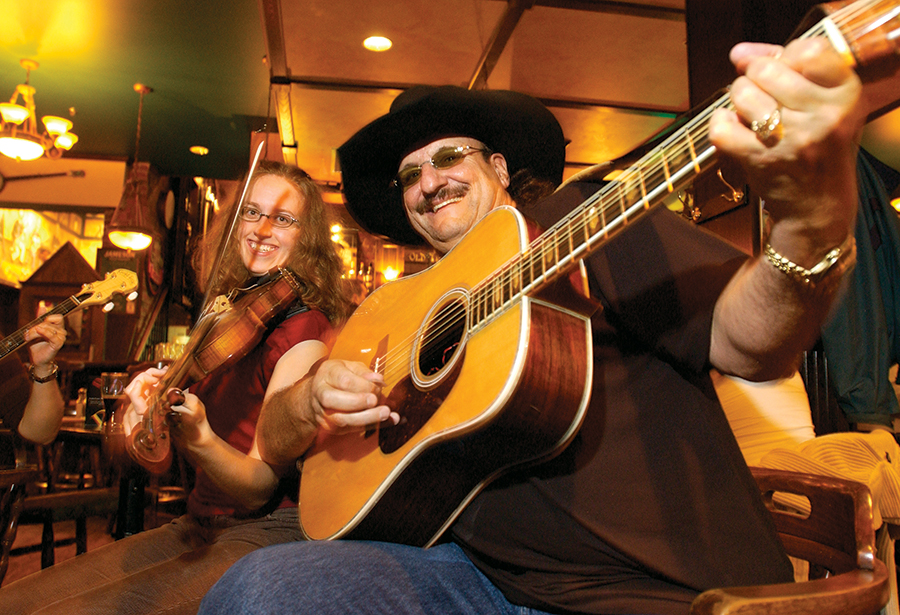
Danny tells of a day in 2002 when he and Dennis played at a school assembly in Cincinnati to encourage students to attend youth night at the Billy Graham Crusade: “The principal said, ‘When you get up there, just don’t say the words God or Jesus. The federal government won’t let us say those words.’ We reminded him we were there to invite people to the Crusade. ‘I know,’ he said, ‘but just don’t say Jesus or God.’”
Naturally, Dennis made sure he said those words! As the assembly ended, Danny was afraid they would be reprimanded, but instead, the principal said it was wonderful, and then he enthusiastically encouraged the students to attend the Crusade that evening.
Dennis’ friendship with Billy and Ruth Graham has made a lasting impact on him. Mr. Graham loved the big black cowboy hat Dennis often wore, and he encouraged Dennis to wear it whenever he played. And it was Mrs. Graham who challenged Dennis to learn Handel’s “Hallelujah” chorus and play it at a Crusade.
“I did, and I’ve done it ever since,” Dennis says. “Every time I do it, I think about her. Once, I was with Mr. Graham in his home, and he asked me to play the ‘Hallelujah’ chorus. Then he said, ‘That was played at our wedding. It meant a lot to me.’”
The way Dennis relates to people in small settings says a lot about the kind of man he is. People sense his sincerity and authenticity.
“We’ve been together in lots of prisons,” Parrish recalls. “He relates to the inmates not as ‘us and them,’ but as ‘You are here, and if not for the grace of God, I would be, too. And I want to tell you about the God who loves you.’”
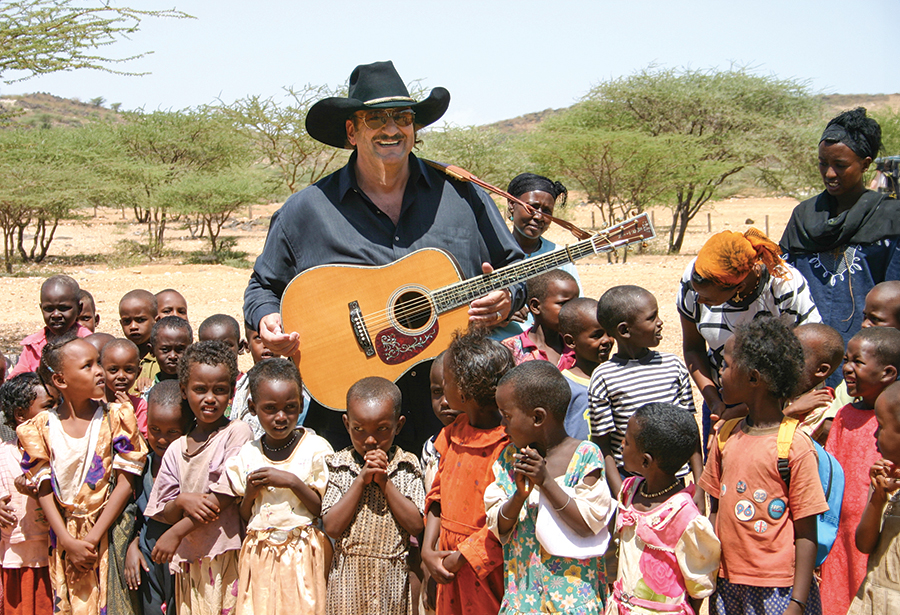
At one meeting, Dennis met the men who played on the prison’s praise team during chapels, and he noticed that their guitar was badly out of tune. Not only did he spend time giving the guitar player some pointers, he left his own tuner with the chaplain so the praise team could stay in tune.
In 2004, during Franklin’s East Coast Festival in Halifax, Nova Scotia, Dennis joined a group of young evangelists in bringing the Good News of Christ to people on the streets and at a local pub.
But he’s not afraid to stand for Christ even if no one joins him. In June 2008, he stood alone outside a county office in San Diego after California’s Supreme Court made same-sex marriages legal in the state. Dennis noticed that although the Bible teaches that homosexual relationships are sinful, few churches or Christian individuals were speaking out about the wedding ceremonies.
So he went and held a sign proclaiming Jesus Christ as the hope of the world. He didn’t argue with anyone or engage in name-calling; he simply told people what the Bible says about marriage, and he added, “I’m a sinner, and the only difference between you and me is that I’ve accepted Christ into my life. And I want you to do that.”
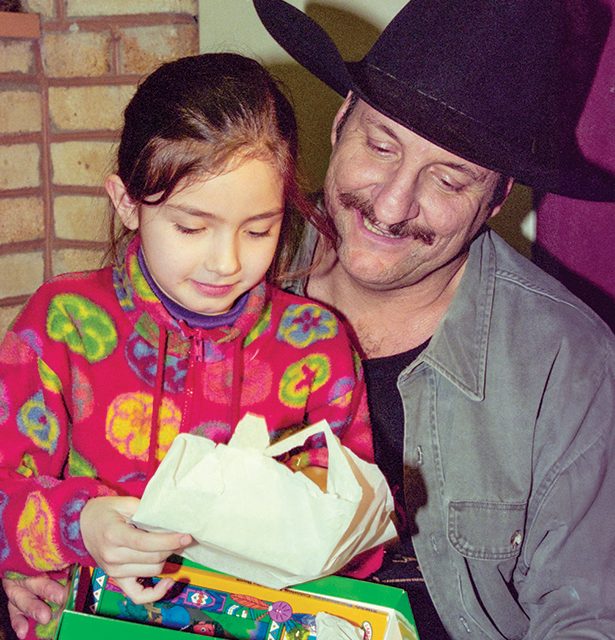
Some might say that Dennis was making a political statement that day, but he would disagree. “Evangelism isn’t right wing or left wing,” he says. “Evangelism is caring for hearts of people who are lost, and it’s sharing the Good News. That’s what evangelism is; that’s what the Billy Graham Evangelistic Association is.”
Dennis also stood alone several years ago when wildfires were raging near his Southern California home. Realizing that both his house and his horses were in danger—and that the fire department would be unable to respond to an individual call since thousands of homes were in the fire’s path—Dennis got a bulldozer and cleared away all of the flammable vegetation around his property, and then he took a garden hose and laid down enough water to save the house and horses.
“That’s a great picture,” Parrish says, “a parable of the kind of person Dennis is: If you need somebody to stand with you in the face of an approaching fire to help you fight it off, Dennis is a good guy to have beside you.” ©2024 BGEA
Photo: Ron Nickel / ©2024 BGEA
